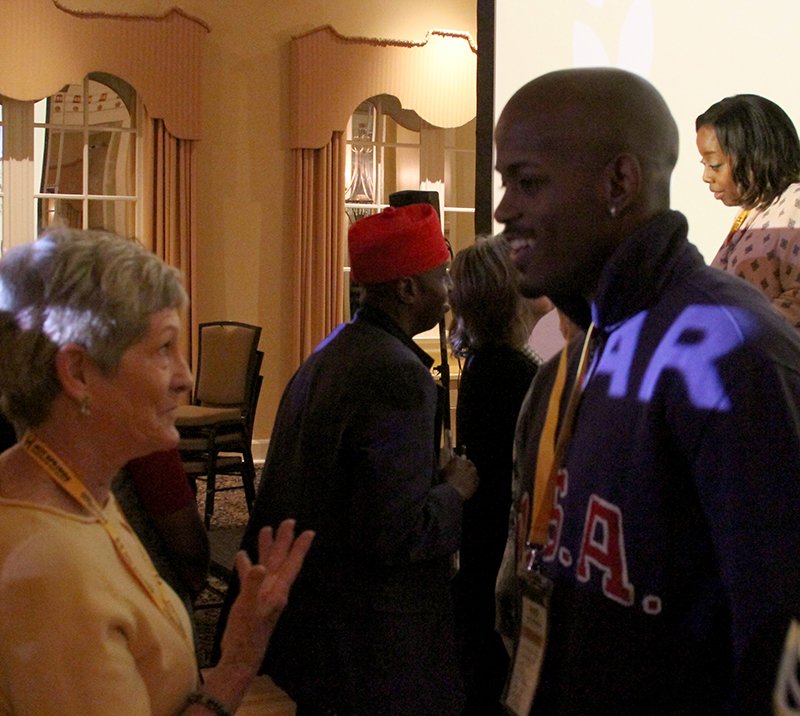Sunday's lineup at the Hot Springs Documentary Film Festival included a film that sought to pull back the curtain on the racial tensions that accented the 1936 Olympics.
"Olympic Pride, American Prejudice" told the full story of the 18 black athletes who competed in the 1936 Olympics in Nazi Germany. The film was shown with a Q&A session with producer Deborah Riley Draper and 2016 Olympic long jump gold medalist and Little Rock native Jeff Henderson following the viewing.
Draper said that given how Jesse Owens is often the only black athlete who is remembered from the games, the purpose of her documentary was to bring the full history of every African-American member of that year's Olympics into full view.
"The purpose of this film was to get to the broader, more complex story of the 1936 Olympics and investigate why Jesse Owens stood as the face when there were 17 other African-Americans who, as an aggregate, would create this springboard for the civil rights movement and the integration of sports," Draper said.
The film first provided a backdrop for the athletes themselves by exploring what life held for African-Americans in the United States and Germany in the years leading up to the then-controversial Olympics. At home, blacks were subjected to Jim Crow laws and possibly even mob lynchings; abroad, the Nazi regime denied blacks basic human rights along with the Jews. But a few universities in the northern and western regions of the United States had recently begun experimenting with the inclusion of black athletes, setting the wheels in motion for them to compete on an international stage.
The United States stood divided on whether to even participate in Germany's Olympics, much less with black athletes. The documentary articulated the debate at hand, which was between black athletes participating in a racist country's Olympic Games versus taking on white supremacy by participation. The decision ultimately came down to a vote by the Amateur Athletic Union on whether to boycott the games, which won in favor of sending a team by the slim margin of 58-56.
The team of black athletes that traveled to compete in Germany consisted of 16 men and two women, who would compete in the games' track and field and boxing events. One such athlete was Mack Robinson, the older brother of Jackie Robinson, who famously desegregated Major League Baseball.
Draper said that the reason the press focused so heavily on Owens was due to his four gold medals, which made it easy to push an "Owens versus Hitler" narrative. She also said that the notion of 18 successful black athletes wouldn't have gone over well with the public at the time.
"It was easy to explain this one athlete against Hitler than, at a time when Jim Crow was prevalent, to say that there were 18 exceptional black people," Draper said. "That's not a story anyone wants to hear. One exceptional black person is digestible; 18, way too much."
Along these lines, Draper pointed out that this idea of one successful black person speaking for an entire group is a phenomenon that extends to the entire black community. Following the viewing, she mentioned that one of the purposes of her film was to break this status quo.
"There is constant need for exceptionalism in the African-American community," Draper said. "We have to really have to dispel that myth and look at all the people who made it. It takes a village."
The film also explored the social dynamics of the 1936 Olympics, from how the black athletes were treated by their teammates to the press's coverage of the games. It showed how Nazi Germany sought to cover up their racism during the Olympics, ordering their Olympic Village to be accommodating to the black athletes and for the press to paint Berlin, where the Olympics were held, as a city that welcomed them.
Within the United States' Olympic team, the group faced extremes. The documentary cited friendships across color lines as well as some of the athletes being sent home by their own teams. A notable case of this was in the instance of track and field competitor Louise Stokes, the first woman to participate in an Olympic games, who was sent home right before her event.
The film closed by discussing the importance of the athletes' participation in the 1936 Olympic Games. In the film, Dr. Dexter Blackman, a history professor at Loyola Marymount University, said that it paved the way for the further desegregation of sports.
"If you had had the boycott, you wouldn't have a Jackie Robinson a decade later," Blackman said.
Henderson expressed gratefulness for the history displayed in the film. He said that as a black Olympian himself, the importance of the documentary carries over into his life, especially when answering questions about competing as a black man.
"People are going to ask you about it," Henderson said. "To know that I'm a black man that has made history myself, I have to know the deeper history."
Henderson also pointed out gratefulness at how sports brings people together, regardless of race or other differences.
"It's a good thing that this film came out to show how sports bring all people together," Henderson said. "It erases everything."
Local on 10/10/2016